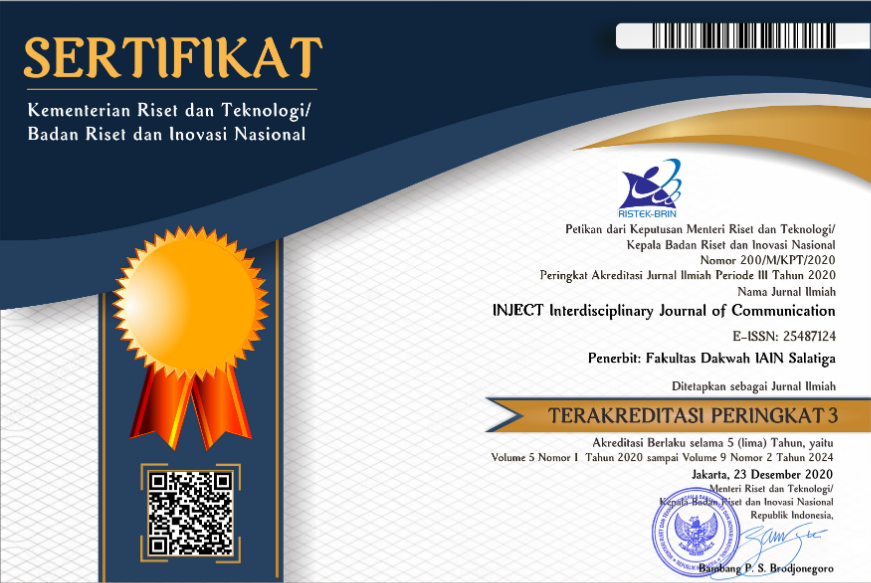Assertive Form of the Local Citizen to Refugees in Pekanbaru Indonesia
Abstract
Keywords
Full Text:
PDFReferences
Book
Yin, R. K. (2011). Qualitative-Research-From-Start-To-Finish. The Guildford Press.
Journal
Afdal, A., Wibowo, T. H., Alfia, V., & Maysitoh, M. (2019). How assertive behavior differences among Minang, Malay, Batak, and Kerinci student’s cultures? COUNS-EDU: The International Journal of Counseling and Education, 4(4), 134.
Almohamed, A., & Vyas, D. (2016). Vulnerability of Displacement: Challenges for Integrating Refugees and Asylum Seekers in Host Communities. Proceedings of the 28th Australian Conference on Computer-Human Interaction (OzCHI’16), 125–134.
Bacinskiene, Laura; Jakimovska-Garbauskaite, J. (2016). Integrating Refugees Through Youth Work Activities. Institute for Policy Research and Analysis, 304, 3–98.
Calvó-Armengol, A., de Martí, J., & Prat, A. (2015). Communication and influence. Theoretical Economics, 10(2), 649–690.
Fleay, C., Hartley, L., & Kenny, M. A. (2013). Refugees and asylum seekers living in the Australian community: The importance of work rights and employment support. Australian Journal of Social Issues, 48(4), 473–493.
Froese, F. J., Peltokorpi, V., & Ko, K. A. (2012). The influence of intercultural communication on cross-cultural adjustment and work attitudes: Foreign workers in South Korea. International Journal of Intercultural Relations, 36(3), 331–342.
Hebbani, A., Colic-Peisker, V., & Mackinnon, M. (2018). Know thy Neighbour: Residential Integration and Social Bridging among Refugee Settlers in Greater Brisbane. Journal of Refugee Studies, 31(1), 82–103.
Irawanto, D. W. (2009). An Analysis Of National Culture And Leadership Practices In Indonesia. Journal of Diversity Management (JDM), 4(2), 41–48.
Kirui, P., & Mwaruvie, J. (2012). The Dilemma of Hosting Refugees: A Focus on the Insecurity in North-Eastern Kenya. In International Journal of Business and Social Science (Vol. 3, Issue 8).
Kumssa, A., & Jones, J. F. (2014). Human Security Issues of Somali Refugees and the Host Community in Northeastern Kenya. Journal of Immigrant and Refugee Studies, 12(1), 27–46.
McKay, F. H., Thomas, S. L., & Kneebone, S. (2012). “It would be okay if they came through the proper channels”: Community perceptions and attitudes toward asylum seekers in Australia. Journal of Refugee Studies, 25(1), 113–133.
Petraki, E., & Ramayanti, I. (2018). Navigating the Indonesian workplace hierarchy: Managers’ use of humour as a rapport-building strategy. Journal of Pragmatics, 134, 199–209.
Shoji Nishimura, Nevgi, A., & Tella, S. (2010). Communication Style and Cultural Features in High/Low Context Communication Cultures: A Case Study of Finland, Japan, and India. Physical Review E - Statistical, Nonlinear, and Soft Matter Physics, 81(4), 783–796.
Smith, P. B. (2011). Communication styles as dimensions of national culture. Journal of Cross-Cultural Psychology, 42(2), 216–233.
Stadler, S. (2019). Laughter and its functions in Japanese business communication. Journal of Pragmatics, 141, 16–27.
Wang, Y., Wu, L., Xie, K., & Li, X. (Robert). (2018). Staying with the ingroup or outgroup? A cross-country examination of international travelers’ home-sharing preferences. International Journal of Hospitality Management, 77(January 2018), 425–437.
Jaji, R. (2014). Religious and ethnic politics in refugee-hosting: Somalis in Nairobi, Kenya. Ethnicities, 14(5), 634–649.
LeFebvre, R., & Franke, V. (2013). Culture Matters: Individualism vs. Collectivism in Conflict Decision-Making. Societies, 3(1), 128–146.
Website
Curby, N. (2020, October). The wait: Indonesia’s refugees describe life stuck in an interminable limbo wait: Indonesia’s refugees describe life stuck in an interminable limbo. The Guardian. https://www.theguardian.com/australia-news/2020/oct/21/the-wait-indonesias-refugees-describe-life-stuck-in-an-interminable-limbo (Date access: 12 Agustus 2021)
Thesis
Grindheim, K. A. (2013). Exploring the impacts of refugee camps on host communities. A case study of the Kakuma host community in Kenya. University of Agder Thesis, 1–127.
DOI: https://doi.org/10.18326/inject.v6i2.159-170
Refbacks
- There are currently no refbacks.
Copyright (c) 2022 Happy Wulandari

This work is licensed under a Creative Commons Attribution 4.0 International License.








